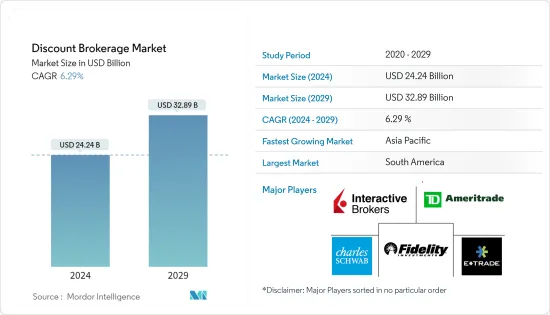PUBLISHER: Mordor Intelligence | PRODUCT CODE: 1521631

PUBLISHER: Mordor Intelligence | PRODUCT CODE: 1521631
Discount Brokerage - Market Share Analysis, Industry Trends & Statistics, Growth Forecasts (2024 - 2029)
The Discount Brokerage Market size is estimated at USD 24.24 billion in 2024, and is expected to reach USD 32.89 billion by 2029, growing at a CAGR of 6.29% during the forecast period (2024-2029).

Discount brokerages have become increasingly popular among investors due to their low-cost structures and accessibility. Discount brokerage services are in high demand as it is simple for people to now manage their money due to technological advancements and internet trading platforms. The discount brokerage market has been greatly influenced by technological advancements.
Online trading platforms have become more sophisticated, offering intuitive user interfaces, real-time market data, advanced charting tools, and mobile accessibility. Investors may now conduct transactions and manage their portfolios more easily due to these technological advancements. Some discount brokerages have ventured into the robo-advisory space, offering automated investment management services. Robo-advisors use algorithms and computer models to offer tailored investing advice according to a person's risk tolerance and financial goals. This hybrid model combines the cost advantages of a discount brokerage with the convenience of automated portfolio management.
Discount Brokerage Market Trends
Increase in Enterprise Market is Fuelling the Market
As the enterprise market expands, more companies may offer employee stock options as part of their compensation packages. This may result in increased demand for brokerage services among employees who want to exercise their options or sell their vested shares. With the growth of the enterprise market, companies may expand their employee retirement plans, such as 401(k) or pension schemes. Enterprise companies often adopt equity compensation platforms to manage employee stock grants, stock options, and other equity-related incentives. These platforms can integrate with discount brokerages to provide a seamless experience for employees to manage their investments. This integration can drive the growth of the discount brokerage market as more enterprises adopt such platforms.
Rise of Discount Brokerage Market in Asia-Pacific
The region has witnessed a significant increase in internet penetration, particularly in countries like China and India. This has facilitated the growth of online trading and enabled more individuals to access discount brokerage services. The advancements in technology, particularly in the area of financial technology (fintech), have made it easier for brokerage firms to offer online trading platforms. Many investors in the Asia-Pacific region are cost-conscious and seek competitive pricing for their investment activities.
Some countries in the Asia-Pacific region have undertaken market liberalization measures, allowing increased participation of foreign investors and encouraging competition in the brokerage industry. This has resulted in the entry of new players, including discount brokerages, offering innovative services. The number of retail investors in the Asia-Pacific area has increased, driven by a growing middle class, rising income levels, and increasing financial literacy. Discount brokerages cater to this expanding retail investor base by providing accessible and affordable investment options.
Discount Brokerage Industry Overview
The discount brokerage market is consolidated, with few players leading the market. Some of the major players in the global market include Interactive Brokers, TD Ameritrade, Charles Schwab, ETrade, and Fidelity Investments, among others. In the study period, market players were also involved in mergers & acquisitions and partnerships focused on expanding their presence in the market. During the forecast period, the market offers growth prospects, which are anticipated to intensify competition. However, mid-size to smaller businesses are expanding their market presence by landing new contracts and breaking into untapped sectors thanks to product innovation and technology improvement.
Additional Benefits:
- The market estimate (ME) sheet in Excel format
- 3 months of analyst support
TABLE OF CONTENTS
1 INTRODUCTION
- 1.1 Study Assumptions and Market Definition
- 1.2 Scope of the Study
2 RESEARCH METHODOLOGY
3 EXECUTIVE SUMMARY
4 MARKET DYNAMICS
- 4.1 Market Overview
- 4.2 Market Drivers
- 4.2.1 Low-cost Trading Fee is Driving the Market
- 4.2.2 Increasing Popularity of Self-directed Investing
- 4.3 Market Restraints
- 4.3.1 Intense Competition among Discount Brokerage Firms
- 4.3.2 Potential for Technological Limitations
- 4.4 Market Opportunities
- 4.4.1 Expanding the Range of Investment Products and Services
- 4.5 Porter's Five Forces Analysis
- 4.5.1 Threat of New Entrants
- 4.5.2 Bargaining Power of Buyers/Consumers
- 4.5.3 Bargaining Power of Suppliers
- 4.5.4 Threat of Substitute Products
- 4.5.5 Intensity of Competitive Rivalry
- 4.6 Insights on Technological Innovations in the Market
- 4.7 Impact of COVID-19 on the Market
5 MARKET SEGMENTATION
- 5.1 By Mode
- 5.1.1 Online Discount Brokerage Service
- 5.1.2 Offline Discount Brokerage Service
- 5.2 By Application
- 5.2.1 Individual
- 5.2.2 Enterprise
- 5.2.3 Government Agencies
- 5.3 By Services
- 5.3.1 Order Execution and Advisory
- 5.3.2 Discretionary
- 5.3.3 Online Trading Platforms
- 5.3.4 Education and Investor Resources
- 5.4 By Commission
- 5.4.1 Commission-free Brokers
- 5.4.2 Fixed Commission Brokers
- 5.5 Geography
- 5.5.1 North America
- 5.5.1.1 United States
- 5.5.1.2 Canada
- 5.5.1.3 Mexico
- 5.5.1.4 Rest of North America
- 5.5.2 Europe
- 5.5.2.1 Germany
- 5.5.2.2 United Kingdom
- 5.5.2.3 France
- 5.5.2.4 Russia
- 5.5.2.5 Spain
- 5.5.2.6 Rest of Europe
- 5.5.3 Asia-Pacific
- 5.5.3.1 India
- 5.5.3.2 China
- 5.5.3.3 Japan
- 5.5.3.4 Rest of Asia-Pacific
- 5.5.4 South America
- 5.5.4.1 Brazil
- 5.5.4.2 Argentina
- 5.5.4.3 Rest of South America
- 5.5.5 Middle East
- 5.5.5.1 United Arab Emirates
- 5.5.5.2 Saudi Arabia
- 5.5.5.3 Rest of Middle East
- 5.5.1 North America
6 COMPETITIVE LANDSCAPE
- 6.1 Market Concentration
- 6.2 Company Profiles
- 6.2.1 Interactive Brokers
- 6.2.2 TD Ameritrade
- 6.2.3 Charles Schwab
- 6.2.4 ETrade
- 6.2.5 Fidelity Investments
- 6.2.6 Robinhood
- 6.2.7 Vanguard
- 6.2.8 Ally Invest
- 6.2.9 Firstrade
- 6.2.10 DEGIRO*
7 MARKET FUTURE TRENDS
8 DISCLAIMER AND ABOUT US




